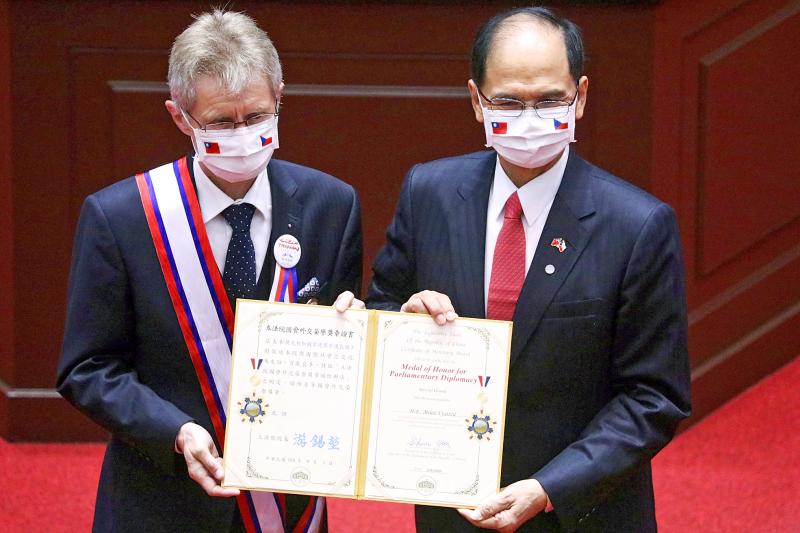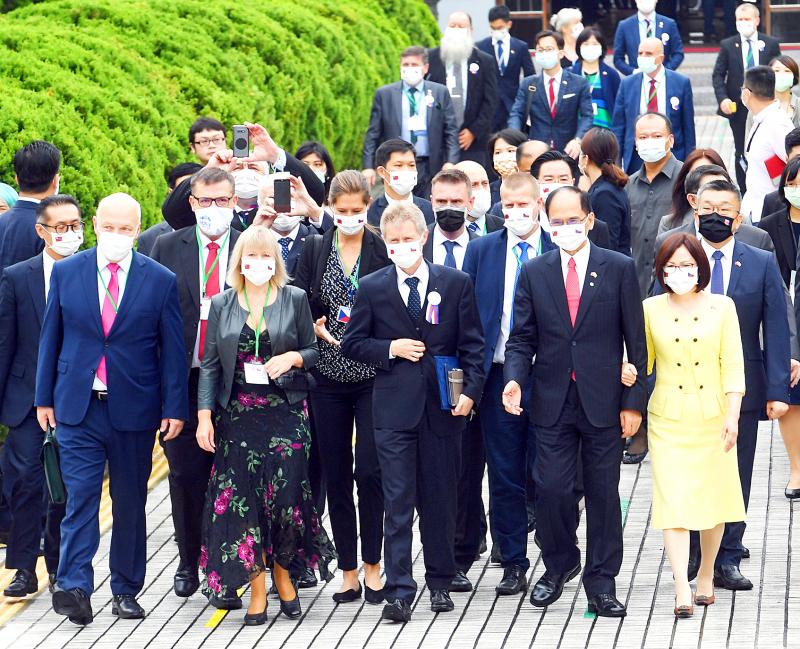Czech Senate President Milos Vystrcil yesterday said that he is “Taiwanese,” as Taiwan and the Czech Republic share the common goal of defending democratic values.
Speaking at the Legislative Yuan in Taipei, Vystrcil began his speech by comparing the differences between the Czech and Taiwanese parliaments, with the former bicameral and the latter unicameral.
Although this would inevitably raise the question of which system works better, he said he believes there is not a single system that would be the best or would suit all nations, as countries in a free and democratic world have different criteria for functional democracy.

Photo: REUTERS
However, all legislative bodies in functional democratic systems uphold human life as the highest value, he added.
Laws are not passed to dictate what people should think or do, or to limit their natural desire for freedom, but to protect and care for them, and guarantee their basic rights and freedoms, Vystrcil said.
There is no perfect piece of legislation, as each law is merely an imperfect description of how lawmakers believe society should ideally function, he said.

Photo: CNA
As every law is bound to be imperfect, the fundamental role of democratic principles or the definition of the fundamental values and respect or such values is in the spotlight again, Vystrcil said.
As such, he believes that the legislative bodies of democratic nations not only have a responsibility to pass legislation, but also to defend democratic principles, he said.
Vystrcil said he is convinced that it is the duty and obligation of every democrat to support anyone who defends democratic institutions and who often establish democracy in difficult conditions.
He is therefore glad that he was able to visit the Legislative Yuan within the framework of parliamentary diplomacy to share experience and expand mutual cooperation, he said.
In 1963, then-US president John F. Kennedy, in criticizing communism, said: “Freedom is indivisible, and when one man is enslaved, all are not free,” Vystrcil said.
Just as Kennedy supported West Berlin’s pursuit of freedom by proclaiming “Ich bin ein Berliner,” Vystrcil said that he would also like to express his support for Taiwan and freedom with a more humble, but equally strong statement.
“I am Taiwanese,” he said in Mandarin.
Vystrcil said he wished Taiwan an independent, true and just future.
His statement that he is Taiwanese won him a standing ovation from lawmakers across party lines.
Asked by reporters about a remark on Monday by Chinese Minister of Foreign Affairs Wang Yi (王毅) that the Czech Republic would “pay” for sending a delegation to Taiwan, Vystrcil said that the visit does not go against Beijing’s “one China” principle.
He added that the Czech Republic has its “own interpretation” of that policy.
The Czech delegation is visiting Taiwan to consolidate partnership, reiterate the independent status of the Czech Republic and assert that it “would not follow the orders of non-democratic nations,” and would engage in exchanges with democratic nations with shared values, he said.
Prior to delivering his speech, Vystrcil was awarded the Legislative Yuan’s grand medal of diplomatic excellence and a model speaker’s gavel by Legislative Speaker You Si-kun (游錫堃).
In a statement, You lauded Vystrcil’s visit in the face of the Chinese Communist Party’s “wolf-warrior diplomacy” as the manifestation of the traditional defiant spirit of Czechs that have been evident in the Defenestrations of Prague, the Prague Spring and the Velvet Revolution.

CHAOS: Iranians took to the streets playing celebratory music after reports of Khamenei’s death on Saturday, while mourners also gathered in Tehran yesterday Iranian Supreme Leader Ayatollah Ali Khamenei was killed in a major attack on Iran launched by Israel and the US, throwing the future of the Islamic republic into doubt and raising the risk of regional instability. Iranian state television and the state-run IRNA news agency announced the 86-year-old’s death early yesterday. US President Donald Trump said it gave Iranians their “greatest chance” to “take back” their country. The announcements came after a joint US and Israeli aerial bombardment that targeted Iranian military and governmental sites. Trump said the “heavy and pinpoint bombing” would continue through the week or as long

TRUST: The KMT said it respected the US’ timing and considerations, and hoped it would continue to honor its commitments to helping Taiwan bolster its defenses and deterrence US President Donald Trump is delaying a multibillion-dollar arms sale to Taiwan to ensure his visit to Beijing is successful, a New York Times report said. The weapons sales package has stalled in the US Department of State, the report said, citing US officials it did not identify. The White House has told agencies not to push forward ahead of Trump’s meeting with Chinese President Xi Jinping (習近平), it said. The two last month held a phone call to discuss trade and geopolitical flashpoints ahead of the summit. Xi raised the Taiwan issue and urged the US to handle arms sales to

State-run CPC Corp, Taiwan (CPC, 台灣中油) yesterday said that it had confirmed on Saturday night with its liquefied natural gas (LNG) and crude oil suppliers that shipments are proceeding as scheduled and that domestic supplies remain unaffected. The CPC yesterday announced the gasoline and diesel prices will rise by NT$0.2 and NT$0.4 per liter, respectively, starting Monday, citing Middle East tensions and blizzards in the eastern United States. CPC also iterated it has been reducing the proportion of crude oil imports from the Middle East and diversifying its supply sources in the past few years in response to geopolitical risks, expanding

OTHER OPTIONS: Given possible US intervention and Taiwanese counterattacks, China might opt to blockade Taiwan or take its outlying islands instead of an all-out invasion A US think tank has urged Taiwan to adopt a “hellscape” strategy that would flood the Taiwan Strait with drones and other uncrewed systems to deter invasion by China. In its report, Hellscape for Taiwan, published on Thursday, the Center for a New American Security said Taipei’s asymmetric defense approach — often described as a “porcupine strategy” — needs to evolve to keep pace with the growing capabilities of the Chinese People’s Liberation Army. The “hellscape” strategy involves saturating the air and waters around Taiwan with thousands of drones and other platforms capable of striking invading forces from multiple domains at once. Long-range